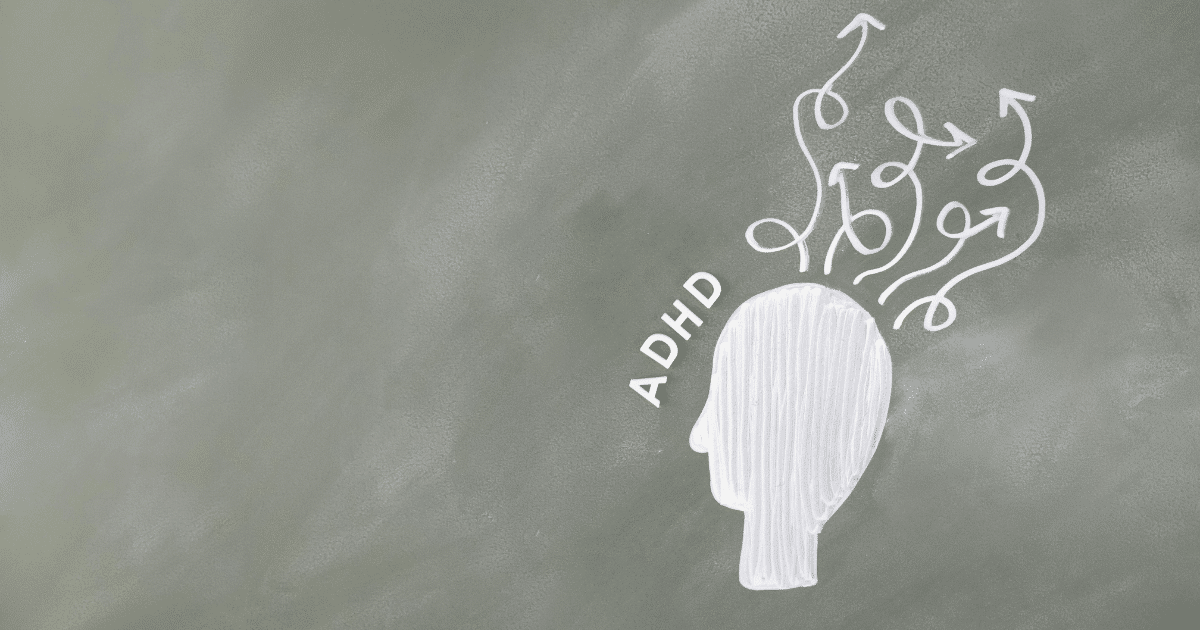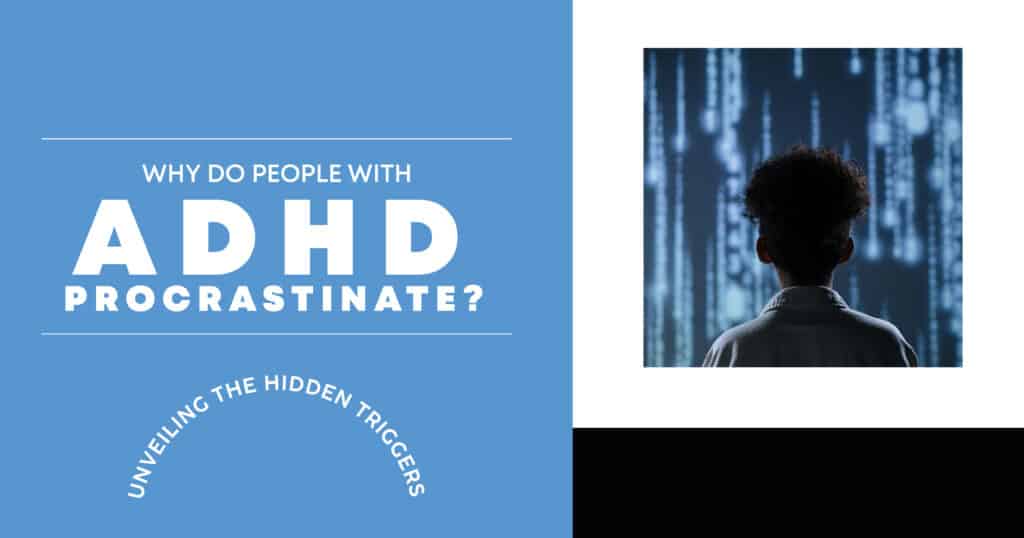Procrastination is a common struggle for many, but for individuals with ADHD, it’s a particular challenge. If you’ve ever wondered, “Why do people with ADHD procrastinate?”, you’re not alone. The reasons behind this delay in task completion are often tied to specific ADHD symptoms like executive dysfunction, time management issues, impulsivity, anxiety, and decision paralysis. This article will uncover these hidden triggers and explore how they contribute to procrastination, offering insights and tips for managing this issue.
Executive Dysfunction and Procrastination
One of the primary reasons why people with ADHD procrastinate is executive dysfunction. This term refers to cognitive processes that help individuals plan, make decisions, and stay organized. Executive dysfunction can manifest in several ways, including:
- Difficulty in prioritizing tasks
- Inability to focus or stay on track
- Struggles with organizing thoughts and actions
This dysfunction makes it hard to break down large projects into smaller, manageable tasks. Individuals with ADHD may feel overwhelmed, leading to task avoidance. Executive dysfunction often goes hand in hand with procrastination, as it impairs an individual’s ability to get started on tasks, leaving them feeling stuck and unable to progress.
The Role of Time Management in ADHD Procrastination
Another reason people with ADHD procrastinate is poor time management. For individuals with ADHD, time seems to pass unpredictably, making it hard to gauge how long tasks will take. This challenge leads to underestimating the time needed, rushing through assignments, or avoiding them altogether.
Common time management issues for people with ADHD include:
- Underestimating task duration
- Overcommitting to multiple tasks
- Missing deadlines
- Struggling to break down tasks into smaller segments

These difficulties often contribute to chronic procrastination, as individuals delay tasks to avoid the overwhelming sense of being behind. Learning strategies like time-blocking or visual reminders are essential to help stay on track.
Impulsivity and Its Impact on Task Completion
Impulsivity is another key factor that impacts task completion in individuals with ADHD. The tendency to act quickly without thinking ahead can cause distractions, making it difficult for people to focus on one task long enough to finish it. This impulsive behavior can lead to task switching, jumping from one project to another without completing any of them.
Impulsive actions can interfere with procrastination in these ways:
- Interrupting focus with spontaneous decisions or distractions
- Starting tasks before fully considering the time or effort needed
- Difficulty resisting temptations and straying from the task at hand
Impulsivity often worsens procrastination because tasks seem less appealing when they require focus or sustained effort. Managing impulsivity is key to reducing procrastination.
Task Avoidance and Focus Difficulties in ADHD
Task avoidance and focus difficulties are central to why people with ADHD procrastinate. Individuals with ADHD often struggle to stay focused on tasks for extended periods. As a result, they may put off or avoid tasks altogether because they seem tedious or difficult.
Key focus issues in ADHD include:
- Difficulty maintaining attention on long or monotonous tasks
- Constant distractions make it hard to stay focused
- Inability to prioritize between various competing tasks
People with ADHD may also avoid tasks that feel too challenging or uncomfortable, further increasing procrastination. Task avoidance is a coping mechanism to deal with the anxiety or frustration associated with these difficulties.
Anxiety and Motivation Challenges in Procrastination
Anxiety and motivation challenges are often at the heart of ADHD-related procrastination. People with ADHD frequently experience heightened levels of anxiety when faced with a task, especially if they have doubts about their ability to complete it successfully. This anxiety can cause a fear of failure, leading them to procrastinate to avoid the negative emotions associated with starting the task.
Anxiety triggers include:
- Fear of failure leads to avoidance
- Low self-esteem resulting from previous struggles
- Overwhelmed by the amount of work
Alongside anxiety, a lack of motivation can make starting and completing tasks feel impossible. It’s common for individuals with ADHD to lack the internal drive to tackle something unless there’s an external push or immediate consequence.
Here are some strategies to overcome procrastination related to ADHD symptoms:
| Strategy | How It Helps | Example |
| Breaking Tasks into Smaller Steps | Makes tasks more manageable and less overwhelming. | Dividing a research paper into outline, draft, and final stages. |
| Using Timers or Time-Blocking | Helps with time management by setting specific work intervals. | Working for 25 minutes, then taking a 5-minute break (Pomodoro Technique). |
| Setting Clear Priorities | Helps focus on what needs to be done first. | Creating a “most important” list at the beginning of each day. |
| Visual Reminders and Checklists | Keeps individuals on track and reminds them of deadlines. | Use a wall calendar or a mobile app to track deadlines. |
| Accountability Partners | Provides external motivation and reduces task avoidance. | Ask a friend to check in on progress and offer support. |
Decision Paralysis and Its Connection to ADHD
Decision paralysis is another challenge that contributes to procrastination. When faced with multiple choices or tasks, people with ADHD may struggle to make decisions, often leading to an inability to move forward. The constant overthinking and second-guessing of choices can prevent them from taking action, thus amplifying procrastination.

How decision paralysis affects ADHD:
- Difficulty deciding which task to tackle first
- Overwhelm from too many options or steps in a task
- Indecision due to fear of making the wrong choice
To combat decision paralysis, breaking tasks down into smaller steps can make it easier to start and continue working without feeling overwhelmed by choices.
Hillside Horizon for Teens Helps You Manage ADHD and Procrastination
At Hillside Horizon for Teens, we understand the unique challenges individuals with ADHD face, especially when it comes to procrastination. Our specialized programs and therapeutic approaches can help you manage ADHD symptoms, such as executive dysfunction and anxiety, that often lead to procrastination.
We offer:
- Individualized treatment plans tailored to your specific needs
- Cognitive-behavioral therapy (CBT) to address time management and decision-making issues
- Holistic therapies, such as mindfulness and art therapy, can reduce anxiety and improve focus
Struggling with ADHD and procrastination? Contact Hillside Horizon for Teens and start your journey today!
FAQs
- How does executive dysfunction contribute to procrastination in people with ADHD?
Executive dysfunction makes it difficult to organize tasks and prioritize. This leads to feeling overwhelmed and avoiding starting tasks, which results in frequent procrastination.
- In what ways does poor time management affect procrastination among individuals with ADHD?
Poor time management leads to underestimating task durations. This causes missed deadlines and incomplete tasks, increasing procrastination. People with ADHD often feel rushed and unprepared.
- Why does impulsivity interfere with completing tasks for those with ADHD?
Impulsivity causes distractions and frequent task switching. This prevents individuals from focusing on one task long enough to complete it, resulting in unfinished work.
- How do focus difficulties and task avoidance manifest in ADHD procrastination?
Focus difficulties prevent sustained attention on challenging tasks. Task avoidance occurs when individuals delay starting tasks due to frustration, leading to chronic procrastination.
- What is the relationship between anxiety, motivation challenges, and procrastination in ADHD?
Anxiety about tasks causes avoidance and delays in starting them. Low motivation makes it hard to finish assignments. Together, these factors lead to prolonged procrastination.




